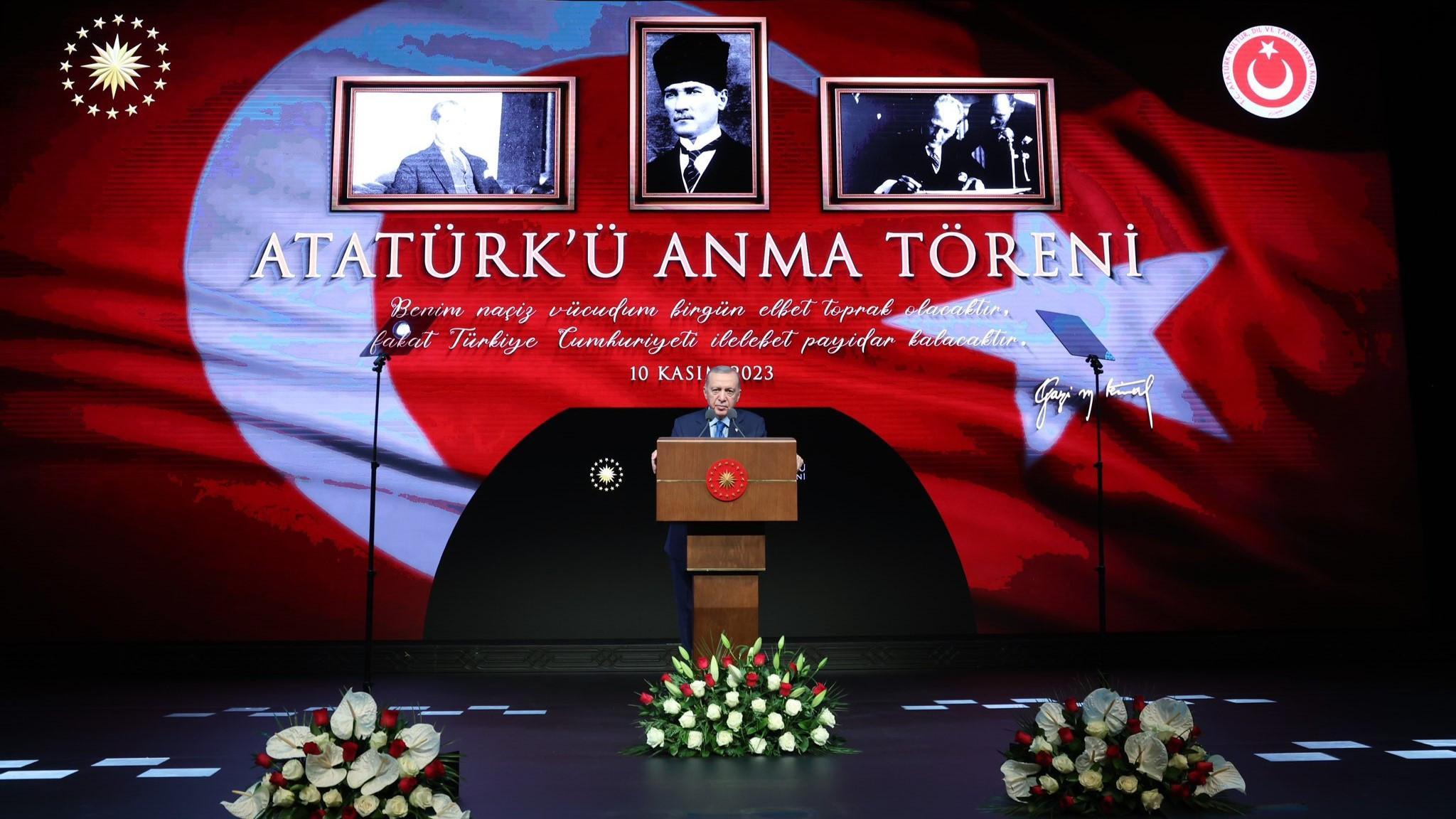
President Recep Tayyip Erdoğan has declared Türkiye's active pursuit of international support to bring a swift resolution to the ongoing conflict between Israel and Hamas.
"The effort to halt the loss of life, to comfort terrified children and to alleviate their suffering is not the end goal but the initial step toward a solution," Erdoğan told a group of journalists on his return from Uzbekistan on Nov. 9.
Türkiye is engaging with international platforms, utilizing diplomatic channels to their fullest extent to secure a ceasefire, Erdoğan said, outlining efforts for a fair, just and lasting solution, while seeking to generate international public opinion in favor of this resolution.
"We are meticulously planning post-ceasefire steps, developing formulas for a grounded and sustainable peace," he emphasized.
Erdoğan also stressed the importance of post-war cleanup, acknowledging that extensive work would be required in removing rubble. "We are receiving positive signals in our diplomatic efforts [in this direction]," he added.
'Riyadh summit crucial'
The president also underscored the significance of the upcoming Organization of Islamic Cooperation summit in the Saudi capital Riyadh, scheduled for the weekend. "We will gather there to discuss the issue in detail and negotiate to ensure a humanitarian ceasefire is established as soon as possible," he stated.
Calling for a strategic and effective approach, Erdoğan cautioned against "uncoordinated actions that could harm the Palestinian cause." He emphasized the regional connection, stating, "We are the people of this region. We cannot put forward impulsive and populist policies like those that come from outside. Every pain here hurts us."
Top court 'repeats mistakes'
Meanwhile, Erdoğan addressed the ongoing disagreement between the Constitutional Court and the Supreme Court regarding the case of jailed MP Can Atalay.
The latter has decided to file criminal complaints against members of the top court over a profound disagreement on the case of imprisoned Workers’ Party of Türkiye (TİP) lawmaker Can Atalay, in a first and unprecedented legal dispute in the history of the Turkish judiciary.
The Constitutional Court earlier ruled that the “right to be elected" and "personal freedom and security" rights of Atalay, who was imprisoned over alleged links to the 2013 Gezi Park protests, were breached.
Atalay, sentenced to 18 years in prison last year in connection with his involvement in the nationwide protests, was elected to the parliament in the May polls from the southern Hatay city but remained in detention.
The violation of rights decision was widely anticipated to lead to Atalay's release. However, the local court opted to forward the case file to the Supreme Court’s Chief Public Prosecutor's Office.
In a unanimous and historically significant 23-page ruling, the Supreme Court has ruled to disregard a Constitutional Court decision for the first time, refusing to comply with the violation decision and release order.
"No one can deny that the Supreme Court is a high court," the president said, criticizing the top court for "repeated mistakes."
Erdoğan called for quicker decisions in such matters, noting that "this slow process, such as lifting immunities, allowed some terrorists to flee abroad before."
Erdoğan expressed concern over criticisms directed at the Supreme Court and praised the need for a swift resolution. "There is no point in trying to look cute for someone," he also remarked, blasting members of his ruling Justice and Development Party (AKP) who made contrary comments.
'New charter will solve problems'
In a separate speech in the capital Ankara on Nov. 10, marking the death of modern Türkiye founder Mustafa Kemal Atatürk, Erdoğan proposed resolving institutional differences through a new constitution.
"As the head of state, we will take swift steps to prevent differences of opinion from escalating into a constitutional and systemic crisis," he declared.
Erdoğan pledged to find solutions by engaging with representatives of high judicial institutions and recognized jurists. He expressed a commitment to preventing similar debates in the future, "even considering constitutional and legislative amendments if necessary."
"The constitution mandates us, as the head of state, to ensure the harmonious functioning of state organs. We are not a party to this debate but referees," he said.